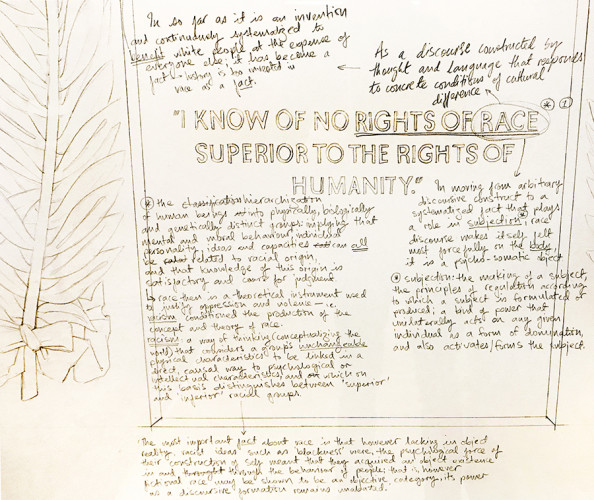
As part of the 200th anniversary of the birth of Frederick Douglass, the Department of Rare Books, Special Collections acquired four pieces of contemporary art by the internationally renowned artist Meleko Mokgosi, Untitled (Drawings for Frederick Douglass, 2018, graphite on paper). These works bring the artist’s textual editing practice to bear on the four monument panels that appear on the Douglass statue plinth.
In the four works, Mokgosi used a text and research-based drawing practice to engage deeply with Douglass, and to depict how his life and words have been memorialized. Mokgosi has redrawn the four monument panels that appear on the Douglass statue plinth, and in his own hand, layered probing questions
and thoughtful comments. Each annotated drawing contains historical footnotes, expanded Douglass quotes, and additional biographical information.
The artist’s probing questions and thoughtful marginalia offer a complex contemporary update to the original words cast in bronze. The Douglass statue is significant in many ways. It is the first public statue erected in honor of an African American, and the original statue is located in Rochester.
The Mokgosi works were first exhibited at the Rochester Contemporary Arts Center early in 2018 in the exhibition, No Soil Better: Art + the Living Legacy of Frederick Douglass. Mokgosi has received international attention for his finely rendered, mural-sized figurative paintings that explore the complexity of politics, history, and culture in postcolonial southern Africa, and has been shown at the Memorial Art Gallery. Mokgosi is also known for his work of textual editing, which perfectly brings his art from gallery to archive.
The Mokgosi pieces of art were added to the Department of Rare Book and Special Collections exhibit, Rochester’s Frederick Douglass, Frederick Douglass’s World: Understanding the Man and His Legacy in summer 2018. They will remain on display in the Seward Room, Rush Rhees Library.

